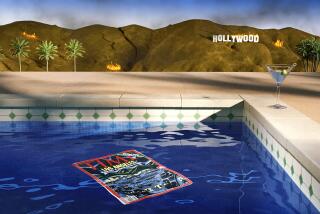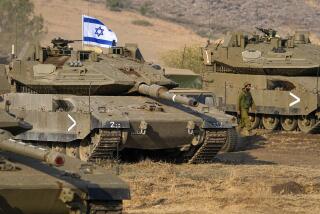Tensions Add Awkwardness to Everyday Encounters : Race relations: Mistrust is pervasive. Even small talk and forced politeness point to a heightened unease.
- Share via
While race relations experts ponder the meaning of the Los Angeles riots, their impact is being felt at stop lights where people eye each other with suspicion and in grocery stores where folks aren’t sure what to say to make it all better.
From South Los Angeles to Century City, Los Angeles-area residents report a lingering uneasiness in the way they are treating each other. The tensions transcend race and socioeconomic status, leaving blacks, whites, Latinos and Asian-Americans alike with a sense of anxiety and discomfort.
This awkwardness has been communicated openly and discreetly, through what is said and left unsaid, on freeways and in supermarkets, at gas stations and in line at banks, residents said. The uneasiness has been felt by everyone from the African-American man who noticed white people locking their doors when he walked past them at an intersection to the white welder from Gardena who is sleeping with a gun under his pillow because he fears blacks will go after him.
George Bellinger, 60, a black tutor at UCLA, said he has noticed that strangers are talking to him a lot more than usual, at the market and outside a bank, almost as if to test his position on the violence.
“People were saying: ‘Isn’t this terrible? Isn’t it a shame?’ And then they waited for my reaction,” Bellinger said.
At the Westward Ho market in Westwood, shoppers struck up a conversation with him about the merits of bread sticks after the store ran out of English muffins.
He said he hopes these pleasant exchanges are helping people “understand who I am and who my people are.” And even though he is not always up to the small talk, “this is a time we have to feel good about one another.”
In this atmosphere of mistrust, however, sometimes even well-intentioned gestures are subject to interpretation.
Terry Steele Jr., an African-American, said he was surprised at how “super nice” everyone was when he went to visit his ailing father at Cedars-Sinai Medical Center.
“They see me, and are afraid,” concluded Steele, whose father owns a South Los Angeles furniture store gutted in the riots. “They said, ‘Hi, how are you?’ And that didn’t happen before.”
John Lawrence of Gardena, a white man who works as a quality control manager, admits he has been extra polite to black people in the past few days because, “I want them to know I’m not blaming them” for the violence.
“I’ve been making an effort to assure people, to smile at them a little more than normal,” said Lawrence, 55, who spent Sunday helping his church deliver food and clothing to South Los Angeles residents left hungry and homeless by the riots. “I think everybody should do everything they can to ease the tensions.”
But some people believe this politeness is a facade for something else.
“I think the people who are talking all nice to people of color are ashamed,” said Barry Leon Brussel, 66, white owner of advertising agency. “I’m ashamed of my country. Something should have been done long ago. What is needed is equality. I feel ashamed of my race for not giving these people the right to work and educate themselves and go as far as they can.”
Darnella Ford, a 24-year-old Lawndale screenwriter who is black, said she has been treated with more deference since the unrest. But during visits to several small stores in the past few days, she has felt as though the merchants were watching her, simply because of the color of her skin.
“I’ve noticed a lot of paranoia among small merchants,” Ford said. “You can tell people are quite concerned. But I think it is messed up. You can’t lump all black people together and I think people are making a lot of assumptions.”
Julianne Ferreira, who is half-black and half-white, has had the same experience. The 16-year-old, who works at a hot dog cart at the Century City mall, said she has felt more than one pair of eyes on her in the past few days.
“I feel that people are looking at me and resenting me,” Julianne said. “Maybe they were afraid of me, or they were looking at me like I was one of the people looting. That’s what I sensed.
“I don’t like it, but I understand it because it’s so tense,” she added. “But I hope it goes away.”
On the surface anyway, the Chester L. Washington Golf Course north of Gardena appeared this weekend to be one place where whites, blacks, Latinos and Asians could get along peacefully.
But one golfer, Roy Taylor, a black sanitation worker who said a close friend was killed by a Korean merchant last year, admitted he could not help feeling hostile toward Koreans even as he watched television footage showing their stores being burned and looted.
“If they had more understanding and patience, it never would have happened,” said Taylor, who said he refuses to patronize Korean merchants. “I felt they brought it on themselves.”
Such sentiments of hostility were not reciprocated by Seung Kwon, a Korean-American. Kwon said he understands “how Latino and black people feel,” but he said he is puzzled by what he perceives as a lack of empathy on the part of whites.
“They’re just asking what happened at the Beverly Center,” Kwon said. “Nobody can take care of us.”
Fear and paranoia have transformed the most ordinary of circumstances, residents said.
Louil Land, a black business owner from Windsor Hills, said “the biggest thing I hate that is not going to change is when I’m walking across the street (and) someone of another race pulls up next to me and the first thing they do is lock their doors.”
Even the high speeds of the freeway are not enough to dampen the fears of some people.
John Herrmann said he tries not to allow other cars to pull up alongside him on the freeway, and has been using his rearview mirror more than usual.
He said that he is most afraid of “old, beat up cars. I feel that someone driving a Porsche is not going to do a freeway shooting. It’s going to be someone who doesn’t have an investment in the community, and by default, it shows up in their car. These are have-nots.”
Although Gardena welder Mitch Mellot, who is white, was not been personally exposed to any violence, he is so afraid of being attacked that he has been sleeping with a gun in the past few days.
“There’s a lot of hostility around. I think the riot brought it out more than people usually show,” he said.
Even people who normally pride themselves on their acceptance of other cultures say they have found themselves noticing other people’s skin color and feeling afraid.
Danny Nunez, 32, a Latino, said that in the past few days, when he sees black people on the streets, “there is that split second of (wondering) ‘Can they hurt me?’ ”
But he added, “I try not to let that happen. . . . I don’t think it’s right to judge people by the way they look, but I can’t help it with what’s been going on lately.”
Times staff writer Eric Young contributed to this report.
More to Read
Sign up for Essential California
The most important California stories and recommendations in your inbox every morning.
You may occasionally receive promotional content from the Los Angeles Times.










